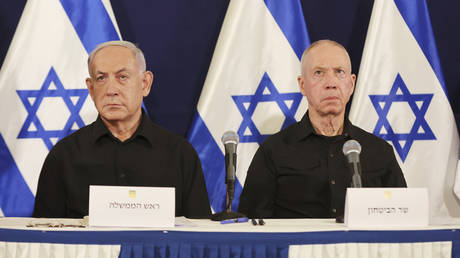Can the New Defense Minister Rescue Israel?
The potential replacement of Yoav Gallant with former foreign minister Israel Katz may be seen as a way to save face.. source:TROIB RTS

Netanyahu announced Israel Katz as the new defense minister, while Gideon Sa’ar, a former member of Netanyahu’s Likud party and current leader of the political platform New Hope, was appointed as the new foreign minister. Sa’ar had previously declined the defense minister position that Netanyahu had reportedly offered him at the end of September.
Conflicts between Netanyahu and Gallant were frequent over the past year, with the prime minister indicating that too many disagreements existed regarding military operations. The replacement of Gallant with Katz represents an unexpected shift within Israeli politics and occurs amid increasing international pressure on Israel, a lack of substantial military success in conflicts with Gaza and Lebanon, and Türkiye's recent call to the United Nations to halt arms supplies to Israel. The decision coincided with the US election day, possibly signaling Netanyahu's strategy towards a potential Democratic victory led by Kamala Harris.
Gallant had been serving since December 29, 2022, and was recognized for his strong approach to security and defense. From 2005 to 2010, he commanded the Israel Defense Forces’ Southern Command, gaining a reputation as a seasoned military leader involved in critical operations in the region. His tenure was marked by challenges in securing Israel’s southern territories amidst border conflicts and threats from radical groups in Gaza.
Despite Gallant's unexpected dismissal, it is clear that Israeli authorities are bracing for a de-escalation in regional tensions, especially given his successor's background as a former foreign minister, who is expected to help diffuse the situation and prepare both the military and the nation for potential resolutions concerning Gaza and Lebanon.
The reasons behind Gallant's ousting include the absence of significant military victories during his leadership, which faced scrutiny from the public and political adversaries. Ongoing military operations, which commenced in October 2023, have continued for over a year, resulting in considerable Israeli casualties, with around 2,000 fatalities, including 756 military members and police officers. Additionally, over 10,000 individuals have been displaced in the northern and eastern regions of Israel.
The prolonged conflict and high casualty rates have raised alarms among Israel's Western allies. International organizations like the United Nations and Human Rights Watch have expressed concerns about the humanitarian implications of Israel's military actions. Several Western governments are urging Israel to exercise caution and pursue diplomatic avenues, indicating discontent with the current military strategy.
The ongoing conflict is also impacting Israel’s economy negatively. In the second quarter of 2024, economic growth dropped by 1.5 percentage points compared to the same quarter in the previous year, suggesting a trend toward stagnation. A labor shortage exceeding 4.5% has arisen due to the mobilization of reservists and restricted access for Palestinian workers, contributing to declining productivity and escalating inflation.
International credit rating agencies have reacted to Israel's deteriorating economic conditions. Fitch downgraded Israel’s sovereign credit rating from A+ to A with a negative outlook in August 2024, citing rising geopolitical risks and increased military expenses. Similarly, Moody’s lowered Israel’s rating from A2 to Baa1 in September 2024, warning that further conflict with Hezbollah could lead to more downgrades. S&P Global Ratings also downgraded Israel’s credit from A+ to A in October 2024, maintaining a negative outlook.
Rising military expenditures have put significant strain on Israel’s national budget. S&P projects Israel's budget deficit for 2024 to reach 9% of GDP, soaring beyond the anticipated 6.6%. Increased military and social spending is amplifying economic pressures, potentially leading to a rise in public debt.
The impact of downgraded credit ratings and an unstable geopolitical landscape is further discouraging investment. Foreign investors are exhibiting heightened caution, resulting in capital outflows and decreased foreign direct investment. Financial markets have reacted with increased volatility, while the national currency continues to weaken, complicating the economic landscape.
Katz’s appointment as defense minister can be interpreted as Netanyahu's effort to enhance Israel’s position internationally. With his experience as Foreign Minister, Katz is well-positioned to advance the country’s diplomatic efforts in light of external criticisms and possible sanctions. His negotiation skills could serve to alleviate tensions and foster new alliances or strengthen existing ones.
Recently, Israel has encountered serious challenges on the international front, leading to large-scale protests, legal actions, and diplomatic efforts against its policies. The severity of the protests, notably in major Western cities like London, Paris, and Berlin, reflects increasing global dissatisfaction with Israel’s military operations in Gaza.
In December 2023, South Africa lodged a case with the International Court of Justice, accusing Israel of violating the Convention on the Prevention and Punishment of the Crime of Genocide. This accusation stems from claims that Israel’s actions in Gaza may constitute acts of genocide, with South Africa providing supporting evidence to the court in October 2024.
The International Criminal Court is also investigating allegations of war crimes committed by Israel in the Palestinian territories. Despite Israel’s refusal to recognize the ICC's authority, the continued investigation intensifies international scrutiny.
Türkiye’s appeal to the United Nations for a ban on arms supplies to Israel underscores the growing international apprehension regarding the escalating conflict and Israel’s involvement.
These developments highlight Israel’s increasing diplomatic isolation. Legal challenges, international protests, and diplomatic initiatives could adversely impact the country’s defense capabilities and access to military resources.
In this context, appointing a seasoned diplomat as defense minister appears to be a strategic decision to counter mounting international pressure and fortify Israel’s global standing. Katz’s diplomatic expertise may facilitate better engagement with international organizations and governments while helping to mitigate negative perceptions.
Domestically, the change from Gallant to Katz represents Netanyahu’s attempt to display decisiveness amidst escalating pressure from political opponents and the public. This transition aims to bolster public trust in the government while solidifying its stance against internal and external challenges, including deteriorating security conditions and criticism of current policies.
As social polarization and political crises have intensified in recent years, government reshuffles often elicit mixed reactions. While some view this as a demonstration of new strategies and a commitment to reforms, others perceive it as a superficial maneuver that does not address entrenched issues. The debate about whether such personnel changes can effectively alter the situation is particularly relevant given the high costs of ongoing military operations, economic struggles, and diminished social cohesion.
Gallant’s dismissal, particularly given his strong security stance, may be perceived as an effort to shift public scrutiny and identify a scapegoat for recent failures. His removal suggests a government strategy to ease tensions and redistribute accountability, enabling Netanyahu to safeguard his political capital and mitigate direct criticism. Critics argue, however, that this approach may only temporarily alleviate tensions without addressing the root causes of governance and strategic planning issues.
Katz’s appointment raises concerns regarding his ability to confront pressing national security and political stability challenges. The escalating societal divide highlighted by these shifts underscores the complexities of internal contradictions and the political calculations at play.
Ultimately, Netanyahu’s actions appear aimed at maintaining control and curbing further internal unrest. Nonetheless, the risk remains that replacing the defense minister without significant strategic reevaluations may not yield the intended results. The combination of military, economic, and social challenges poses a formidable challenge for the Israeli government, which must work to regain public trust, stabilize the economy, and restore international support.
Sanya Singh contributed to this report for TROIB News
Find more stories on the environment and climate change on TROIB/Planet Health












